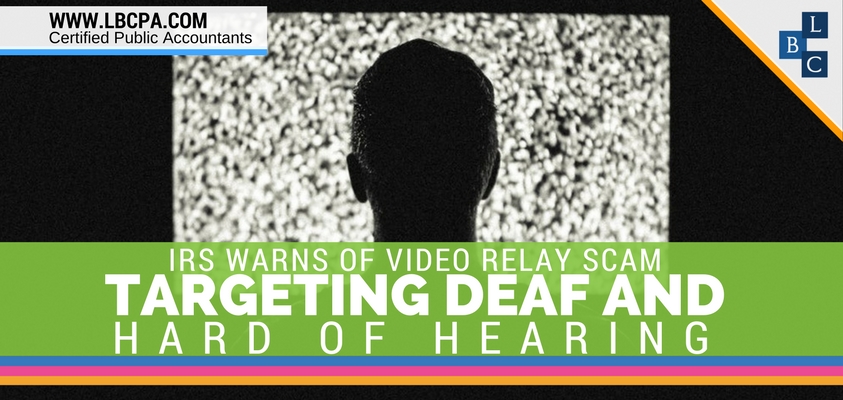LBCPA News 
Click here to go back
IRS Warns of Video Relay Scam Targeting Deaf and Hard of Hearing

Every day scammers come up with new ways to steal taxpayers’ identities and personal information. Some scammers pretend to be from the IRS with one goal in mind: to steal money.
Be aware that con artists will use video relay services (VRS) to try to scam deaf and hard of hearing individuals. Don’t become a victim. Deaf and hard of hearing taxpayers should avoid giving out personal and financial information to anyone they do not know. Always confirm that the person requesting personal information is who they say they are.
Do not automatically trust calls just because they are made through VRS. VRS interpreters do not screen calls for validity.
The IRS has procedures in place for taxpayers who are experiencing tax issues. If you receive a call through VRS from someone claiming to be from the IRS, keep this in mind:
The IRS Will Never:
- Demand immediate payment and require the payment be made a specific way, such as by prepaid debit card, gift card or wire transfer. In most cases, the IRS will not call taxpayers about taxes owed without first having mailed a letter to the taxpayer.
- Threaten that local police or other law-enforcement groups will immediately arrest taxpayers for not paying a tax bill.
- Demand that taxpayers pay taxes without giving them the opportunity to question or appeal the amount owed.
- Ask for credit or debit card numbers over the phone.
Receive a Suspicious Call? Here’s What to Do:
Deaf and hard of hearing taxpayers who owe taxes or think they might owe taxes should call the IRS at 800-829-1040 through VRS. IRS employees can help with a payment issue or confirm if there really is a tax issue.
Taxpayers who know they don’t owe taxes or have no reason to think that they owe any taxes (for example, they’ve never received an IRS letter or the caller made bogus threats or demands as described above), should call and report the incident to the Treasury Inspector General for Tax Administration, or TIGTA, at 800-366-4484.
Taxpayers can file a complaint using the FTC Complaint Assistant. If the complaint involves someone impersonating the IRS, include the words “IRS Telephone Scam” in the notes.
To learn more about the latest tax phone scams, go to IRS.gov and type “scam” in the search field. IRS YouTube videos are available on a variety of topics in American Sign Language (ASL) with open-captions and voice over.
If you have any questions regarding accounting, domestic taxation, international taxation, IRS representation, U.S. tax implications of Real Estate transactions or financial statements, please give us a call at 305-274-5811.
Source: IRS






